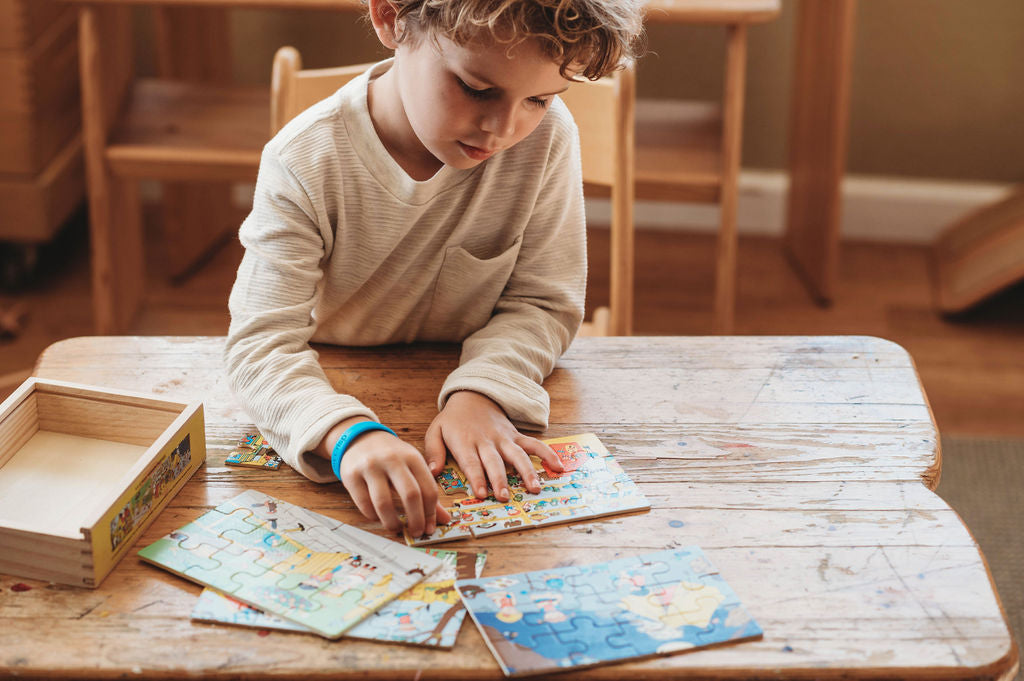
Puzzles have been a beloved pastime for generations, captivating young minds and providing a sense of accomplishment to adults. Beyond their entertainment value, puzzles play a crucial role in development and cognitive health across all ages. From fostering manual dexterity in toddlers to enhancing problem-solving skills in adults, the benefits of puzzles are vast and varied.
Benefits of Puzzles and Early Childhood Development (18 months - 5 years)
Cognitive Development
Introducing puzzles to young children can significantly boost their cognitive abilities. According to experts, puzzles enhance memory and concentration, helping children to develop essential skills such as spatial awareness and visual perception. I remember when my niece, barely two years old, completed her first animal puzzle. The sheer joy and pride on her face were unforgettable. This early introduction not only entertained her, but also laid the foundation for her cognitive growth.
Manual Dexterity
Handling puzzle pieces is a fantastic way for toddlers to improve their fine motor skills and hand-eye coordination. It is no secret that the process of picking up and placing puzzle pieces helps refine manual dexterity, which is a crucial skill for writing and other tasks later in life. This hands-on activity is a fun way to support a child's physical development.
Problem-Solving Skills
Puzzles teach children critical thinking and patience. As they figure out how to fit pieces together, they learn to approach problems methodically and persist until they find a solution. This skill is invaluable as they grow and face more complex challenges.
Benefits of Puzzles for School-Aged Children (6 - 12 years)
Academic Benefits
For school-aged children, puzzles reinforce concepts learned in school. Number and letter puzzles, for instance, can help strengthen their understanding of basic math and literacy. Additionally, themed puzzles can introduce them to new concepts in science and geography, making learning a fun and engaging experience. Educators have long known that puzzles support educational development by promoting a child's understanding of subjects like math and geography.
Social Skills
Puzzles also promote teamwork and cooperative play. Group activities around puzzles encourage children to communicate and work together towards a common goal. This not only enhances their social skills but also teaches them the importance of collaboration.
Emotional Development
Completing a puzzle provides a significant boost to a child's self-esteem. The sense of accomplishment they feel upon completing a puzzle helps build confidence. Additionally, puzzles teach patience and resilience, as children learn to handle frustration and keep trying until they succeed.
Benefits of Puzzles for Teenagers (13 - 18 years)
Advanced Cognitive Skills
Teenagers benefit from puzzles by sharpening their logical reasoning and problem-solving abilities. Complex puzzles challenge their minds and enhance strategic thinking. I recall spending hours with my teenage son on intricate 3D puzzles, which not only improved his cognitive skills but also gave us valuable bonding time.
Educational Advantages
Puzzles support subjects like mathematics, engineering, and computer science, making them an excellent educational tool. They encourage creative thinking and problem-solving, skills that are critical in these fields. Baylor College of Medicine highlights that "Puzzles are particularly beneficial for developing the problem-solving skills required in STEM fields."
Stress Relief
Teenagers often face stress and anxiety, and puzzles can provide a much-needed break. The meditative process of working on a puzzle helps reduce stress and promotes relaxation, making it a beneficial activity for mental well-being.
Benefits of Puzzles for Adults
Cognitive Health
For adults, puzzles are a powerful tool to keep the mind active and sharp. Research cited by the National Science Foundation indicates that "Engaging in activities like puzzles can help delay cognitive decline associated with aging." I've found that working on a challenging puzzle is a great way to unwind after a busy day, keeping my mind engaged and focused.
Mental Well-being
Puzzles provide a sense of accomplishment and purpose, essential for mental well-being. They serve as a mindful activity, promoting relaxation and reducing stress. As noted by Progress Lifeline, "Puzzles are excellent for mental stimulation and can significantly reduce stress levels."
Social Interaction
Puzzles can also be a social activity. Completing a puzzle with family or friends fosters bonding and provides opportunities for meaningful interactions. It's a great way to spend quality time with loved ones while engaging in a mentally stimulating activity.
Puzzles for Seniors
Memory Enhancement
For seniors, puzzles are more than just a pastime; they are a tool to maintain and improve memory. Progress Lifeline notes that "Puzzles help stimulate mental functions, keeping the brain active and sharp."
Manual Dexterity
Maintaining fine motor skills and hand-eye coordination is crucial for seniors, and puzzles offer an enjoyable way to do this. Handling the pieces helps keep their dexterity intact.
Emotional Benefits
Puzzles provide a sense of achievement and purpose, reducing feelings of isolation and loneliness. According to Alliance Homecare, "Group puzzle activities can significantly enhance social interaction and emotional well-being among seniors."
Puzzle play is also a wonderful inter-generational activity where mullti-generations can work together while having meaningful conversation.
Conclusion
From toddlers to seniors, puzzles offer numerous benefits for cognitive and emotional development. They enhance manual dexterity, improve problem-solving skills, and provide a sense of accomplishment. Incorporating puzzles into daily routines can significantly contribute to cognitive health and overall well-being. So, why not try a new puzzle today and experience these benefits firsthand?





